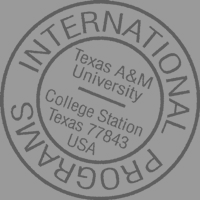Celebrate the wonderfully diverse cultures and heritage of the Brazos Valley community at Brazos Valley Worldfest on November 17, 2007 in historic downtown Bryan from 10 a.m. to 5 p.m.
Brazos Valley Worldfest, presented by Citibank, will celebrate international awareness by offering cultural displays, demonstrations, international cuisine, performances, children's
crafts, educational competitions and many other activities.
This event is free and open to the public.
If you teach in the Brazos Valley, your students are eligible to participate in the Brazos Valley Worldfest Education Competitions:
The Education Competition poster is attached to this message and additional information is available on the Brazos Valley Worldfest site: http://www.brazosvalleyworldfest.org/
Worldfest Flyer for Brazos Valley Worldfest Education Program
Cultural performances include:
World Fashion show presented by the Discovery Program
Flamenco Andaluz of Houston
Texas A&M Bellydance
Academy of Modern Martial Arts of College Station
Kaminari Taiko of Houston
Ballet Folklórico Los Altos de Jalisco
Texasnischer Schuhplattler Verein (German dance group)
Indian Classical Dance
And more to be added
Special events:
The Tipitellers Story Telling Group will be on hand to share Native American Indian stories with children inside a giant tipi in the Kid’s Village adjacent to the Children’s Museum of the Brazos Valley. http://www.tipitellers.org/
Admission to the Children’s Museum of the Brazos Valley will be free all day!
Tellabration!, a national storytelling event, will be taking place inside the Children’s Museum http://www.tellabration.org/
The Bryan Public Library will present “Singabration” which will highlight cultural storytelling set to music. Visitors will have a chance to hear international and folk songs as well as learn about instruments and their significance in different cultures.
http://www.bcslibrary.org/bryan.html
Additional ways to share global culture with your students:
Cultural Suitcases from the Southwestern Bell World Room
http://worldroom.tamu.edu/ Cultural Suitcase flyer is attached.
Cultural Suitcase Flyer
One World Classrooms – New Site
http://www.oneworldclassrooms.org/
OneWorld Classrooms provides a wide range of FREE password-protected, curriculum-based online content for K-12 classrooms that is designed to help students explore different cultures.
Online Classroom Travel Resources allow classes to travel online to the world region they are studying (Africa, China, the Amazon Rain Forest, the Galapagos Islands and the Canadian Arctic), meet students who live there and learn about their lives and cultures
Electronic Cultural Exchange Library features artwork, music, PowerPoints, videos and audio submitted by participating classes from around the world
Student to Student Language Lab allows students to share their first language while they learn a foreign language from their overseas peers.
OneWorld Classrooms also links US classrooms with overseas partner classes to complete art, music, E-mail Q & A, video and PowerPoint exchanges.
Postcard Geography Project
The Postcard Geography project is a national and international, class-to-class exchange of picture (purchased, computer, or handmade) or email postcards. All public and private schools, home schools, and youth groups with students aged 5 to 19 years old are invited to participate. The project will begin on September 24, 2007, and run until February 1, 2008.
The project creates an opportunity to foster global friendships; it is now in its sixteenth year. It is free of charge and open to all learning groups around the world. However, join only if you have a serious commitment to participation. A teacher discussion list, conducted as a blog, will establish an educator community for sharing information and for problem solving.
Registration is open until September 21, 2007. For more information, visit http://pcg.cyberbee.com/ or contact mailto:postcardgeography@comcast.net.
Student Educational Exchange (SEE)
A new, non-profit website that provides a FREE tool for teachers Designed by Connecticut social studies teacher Meghan Connelly
http://www.studenteducationalexchange.org/
The purpose of the site is to make it easy for teachers to increase current events and discussion in your curriculum. Students read articles on the site and respond to discussion prompts on our forum, along with all other SEE student users.
Go to the site now and sign up for an instructor's account, and you will receive a teacher code for your students to use when they register. This will make it easy to track your students' posts. Follow the prompts to create an assignment that your students will see when they login to the site. After that:
Articles are from diverse, worldwide news sources
Background links and discussion prompts are provided for each article.
Articles are categorized by subject area to help teachers align current events with their specific curriculum.
It is easy for you to manage your classes and your students posts.
The World We Want
What a great topic for students to consider.
http://www.unicef.org/videoaudio/video_icdb.html
The deadline for submitting student projects to the 2007 Children's Day broadcast is past, but the topic would be great to use for a digital project in your classroom. Take a look at the example videos. Make a Difference! One Minute Video Contest: http://www.unicef.org/videoaudio/video_icdb.html
Great resources and examples for digital storytelling are also available on the World Room web site. http://worldroom.tamu.edu/
International Children's Day of Broadcasting: "The World We Want"
The 2007 International Children's Day of Broadcasting will take place on 9 December 2007 with the theme "The World We Want." Broadcasters around the world, both television and radio, are encouraged to participate in this special day by creating special programs for kids and inviting youth into the studio to participate in the production and presentation of broadcasts. UNICEF and the International Academy of Television Arts & Sciences will jointly award the International Children's Day of Broadcasting Award to honor broadcasters who capture the spirit of the ICDB.
UNICEF appeals to broadcasters to engage youth in the media-making process not just on the International Children's Day of Broadcasting but throughout the year. Children have the right to voice their opinions and the empowering aspect of participation in radio and television encourages them to develop ideas and inspires them to take action.
